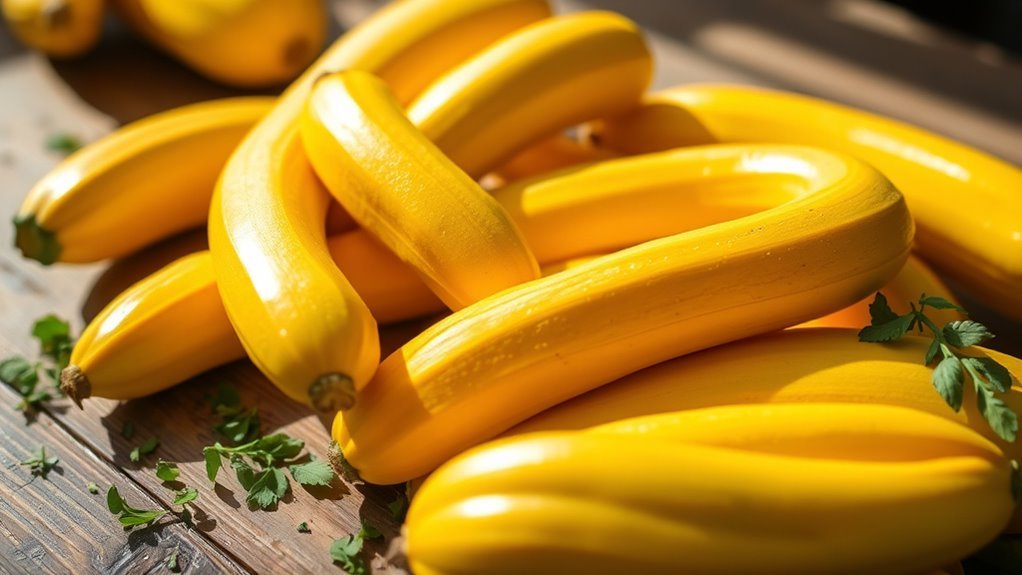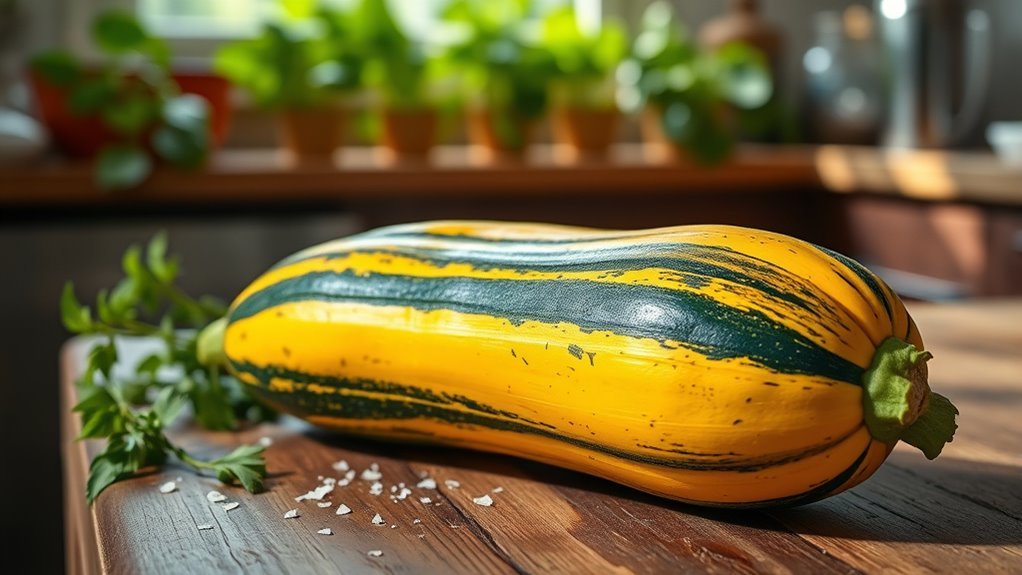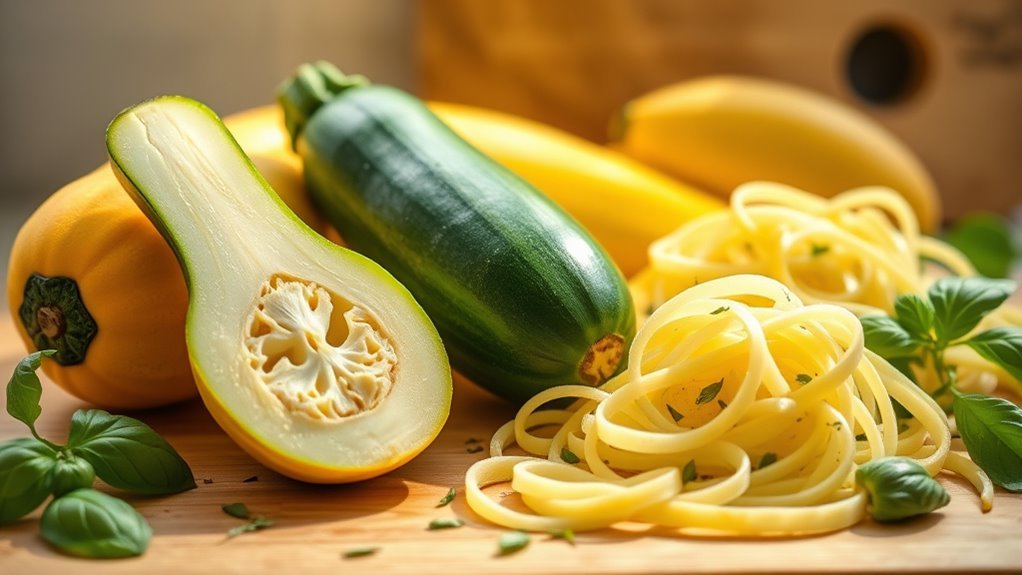Yes, summer squash is keto-friendly. It’s low in carbs, with zucchini having about 2 grams of net carbs per 100 grams and yellow squash around 3 grams. Its high water content and fiber promote satiety, making it a great addition to your meals. You can use it creatively, like in zucchini noodles or casseroles. Plus, it offers essential vitamins that support your overall health. Stick around to discover more about its culinary versatility and health benefits.
Understanding Summer Squash Varieties

When you explore summer squash varieties, you’ll find a diverse range that can enhance your meals while keeping your diet interesting. Zucchini types, such as the classic green zucchini or the more unique yellow squash, offer distinct squash flavors that can elevate your culinary creations. Each variety boasts its own texture and taste, providing versatility in dishes. For instance, yellow squash tends to be sweeter and pairs well with savory ingredients, while zucchini has a mild flavor that absorbs spices beautifully. Incorporating a mix of these squashes not only adds color to your plate but also invites creativity in the kitchen. Embrace the freedom to experiment with these varieties, and you’ll likely discover new favorites that align with your taste preferences.
Nutritional Profile of Summer Squash

Summer squash not only adds variety to your meals but also packs a nutritious punch. It’s low in calories and rich in vitamins and minerals, making it an excellent choice for those seeking health benefits. Here’s a quick look at its nutritional profile:
| Nutrient | Amount per 100g |
|---|---|
| Calories | 16 |
| Protein | 1.2g |
| Carbohydrates | 3.5g |
| Fiber | 1.0g |
| Vitamin C | 21% DV |
The nutritional benefits of summer squash include antioxidants and hydration, which support overall well-being. Incorporating it into your diet can help you achieve a balanced, healthy lifestyle while enjoying its versatility in recipes.
Carb Content in Summer Squash

When considering the carb content in summer squash, it’s essential to look at net carbs, which are calculated by subtracting fiber from total carbohydrates. Compared to other vegetables, summer squash generally contains fewer net carbs, making it a suitable option for those following a keto diet. Understanding this can help you make informed choices about incorporating summer squash into your meals.
Net Carbs Calculation
Although many vegetables are often considered low in carbohydrates, the net carb content of summer squash can vary depending on the type and preparation method. To help you understand its keto-friendly potential, here’s a quick breakdown of net carbs in summer squash:
- Zucchini: About 2 grams of net carbs per 100 grams.
- Yellow Squash: Roughly 3 grams of net carbs per 100 grams.
- Pattypan Squash: Approximately 3 grams of net carbs per 100 grams.
- Cooked Summer Squash: Cooking can reduce net carbs slightly, depending on the method.
These values show that summer squash can be a great addition to your low-carb diet, offering versatility and flavor without compromising your keto goals.
Comparison With Other Vegetables
Many low-carb vegetables are excellent choices for a keto diet, but summer squash stands out due to its relatively low net carb content compared to others. For instance, while zucchini and yellow squash—two popular summer squash varieties—contain about 3-4 grams of net carbs per 100 grams, vegetables like carrots and peas can have over 10 grams. These lower carb counts contribute to summer squash benefits, such as aiding in weight management and providing essential vitamins. Additionally, incorporating summer squash can enhance your meals without compromising your carb limit, allowing for greater culinary freedom. So, if you’re seeking low-carb options, summer squash is a versatile, nutrient-rich ally in your keto journey.
Comparing Summer Squash to Other Vegetables
When you compare summer squash to other vegetables, you’ll notice differences in nutritional content and carbohydrate levels. For instance, while summer squash is low in carbs, some other vegetables may have higher or lower counts depending on their type and preparation. Additionally, cooking methods can greatly affect the nutritional profile, so it’s essential to take into account how you prepare each vegetable.
Nutritional Content Analysis
While summer squash is often celebrated for its versatility in dishes, its nutritional profile warrants a closer look, especially when compared to other popular vegetables. Here’s a quick nutritional analysis to guide your choices:
- Calories: Summer squash is low in calories, often fewer than 20 per cup, making it a great option for light meals.
- Fiber: It contains about 1.5 grams of fiber per cup, promoting digestive health.
- Vitamins: Rich in vitamins A and C, summer squash supports immune function and skin health.
- Minerals: It provides essential minerals like potassium, which helps regulate blood pressure.
When considering your vegetable intake, you’ll find summer squash holds its own, particularly for those seeking a nutrient-dense, low-calorie option.
Carbohydrate Comparison
Although summer squash is a popular choice among low-carb vegetable options, it is essential to compare its carbohydrate content to that of other vegetables to make informed dietary decisions. Here’s a quick comparison of some common keto-friendly vegetables:
| Vegetable | Carbohydrates (g) per 100g | Keto Friendly |
|---|---|---|
| Summer Squash | 3.3 | Yes |
| Broccoli | 6.6 | Yes |
| Cauliflower | 4.9 | Yes |
When evaluating carbohydrate sources, summer squash stands out for its low carb content, making it an excellent addition to your keto diet. However, other keto-friendly vegetables like broccoli and cauliflower also provide valuable nutrients, so it’s best to incorporate a variety into your meals for balanced nutrition.
Cooking Methods Impact
Cooking methods can greatly impact the nutritional value and texture of summer squash compared to other vegetables, so it is crucial to choose wisely. Different cooking techniques can either enhance or diminish its natural flavor and texture variations. Here are some effective preparation methods:
- Sautéing: Quickly cooks squash while preserving its crunch; adds flavor enhancement with herbs.
- Roasting: Brings out sweetness and offers a caramelized exterior, perfect for side dishes.
- Steaming: Maintains nutrients while softening the texture, ideal for light meals.
- Grilling: Adds a smoky flavor and attractive grill marks, making summer squash a standout.
Health Benefits of Summer Squash
Summer squash offers a variety of health benefits that can enhance your overall well-being. It’s low in calories, making it a great choice for weight management. Rich in vitamins A and C, summer squash supports immune function and skin health. Its high fiber content promotes digestive health, helping you feel full longer. Additionally, the antioxidants found in summer squash, like lutein and zeaxanthin, may protect your eyes from age-related issues. The potassium in this vegetable aids in maintaining healthy blood pressure levels. By including summer squash in your diet, you’re not only enjoying a versatile ingredient but also reaping numerous health benefits that contribute to a balanced lifestyle. Embrace the freedom of nourishing your body with this delightful vegetable!
Incorporating Summer Squash Into Your Keto Meals
Incorporating summer squash into your keto meals can enhance both flavor and nutrition. Rich in vitamins and low in carbohydrates, it’s an excellent choice for maintaining your dietary goals. Let’s explore some recipe ideas and tips to make the most of this versatile vegetable in your meal planning.
Nutritional Benefits Overview
While many people might think of summer squash as just a seasonal vegetable, its nutritional profile makes it a valuable addition to a keto diet. You’ll find that summer squash not only enhances your meals but also packs a punch in the health benefits department. Here are a few key reasons to incorporate it:
- Low in Carbs: Perfect for staying within your keto limits.
- Rich in Vitamins: Especially vitamin C and B vitamins for energy.
- High in Fiber: Aids digestion and helps you feel full longer.
- Versatile Culinary Uses: From sautéing to spiralizing, it fits into various dishes effortlessly.
Embracing summer squash can elevate your keto journey while nourishing your body!
Recipe Ideas and Tips
When you’re looking to spice up your keto meals, adding summer squash can be a game-changer. Try spiralizing it for a low-carb pasta alternative or roasting it with olive oil, salt, and pepper to enhance its natural sweetness. Grilling is another fantastic cooking technique that adds a smoky flavor, making it perfect for summer barbecues. For flavor pairings, consider combining summer squash with garlic, fresh herbs like basil or thyme, or even feta cheese for a Mediterranean twist. You can also add it to stir-fries for extra texture and nutrition. Experimenting with these methods will not only elevate your dishes but also keep your meals exciting and aligned with your keto lifestyle.
Creative Summer Squash Recipes for Keto Dieters
Although summer squash is often associated with lighter, seasonal dishes, it can be a versatile ingredient for those following a keto diet. Here are some creative ways to enjoy it:
- Zucchini Noodles – Swap traditional pasta for zucchini noodles in your favorite sauces for a low-carb alternative.
- Stuffed Squash – Fill halved summer squash with a mixture of ground meat, cheese, and spices, then bake until golden.
- Squash Casserole – Layer sliced summer squash with cheese and cream for a rich, comforting dish.
- Creamy Squash Soup – Blend roasted squash with broth and heavy cream for a luscious soup.
These recipes not only embrace the flavors of summer squash but also fit perfectly into your keto lifestyle, giving you plenty of delicious options!
Tips for Selecting and Storing Summer Squash
To make the most of your summer squash recipes, knowing how to select and store this versatile vegetable is important. When you’re at the market, look for squash that’s firm, smooth, and free from blemishes. The best selection includes smaller-sized squash, as they tend to be sweeter and more tender. Avoid any that feel soft or have wrinkled skin.
For proper storage, keep your summer squash in a cool, dry place. If you’ve cut it, wrap it tightly in plastic wrap and refrigerate it to maintain freshness. Ideally, use it within a week for the best flavor and texture. By following these tips, you’ll enjoy delicious summer squash that complements your keto lifestyle perfectly!
Common Misconceptions About Summer Squash and Keto
What do you really know about summer squash and its place in a keto diet? This misunderstood vegetable often gets tangled up in keto myths that can cloud your choices. Here are some common misconceptions:
- High Carb Content: Many assume summer squash is high in carbs, but it actually has low net carbs per serving.
- Not Filling: Some think it’s not satiating, yet its fiber content helps keep you full.
- Limited Uses: People often believe it can only be cooked, but it can be eaten raw in salads too.
- Always a Side Dish: Many see it as a mere side, but it can be the star in various keto recipes.
Understanding these myths can help you fully enjoy summer squash on your keto journey!
Final Thoughts on Summer Squash in a Keto Diet
Understanding the facts about summer squash can greatly enhance your keto experience. This versatile vegetable is low in carbs and high in water content, making it an excellent addition to your keto diet. The summer squash benefits include essential vitamins and minerals, which can help you maintain overall health while adhering to low-carb principles. Its mild flavor allows for creative cooking, so you can enjoy diverse meals without sacrificing your dietary goals. Plus, the fiber content promotes digestive health, supporting your body during this change. Ultimately, summer squash’s keto diet compatibility means you can indulge in delicious dishes while staying on track. Embrace this nutrient-rich option and savor the freedom it brings to your culinary repertoire.
Frequently Asked Questions
Can I Eat Summer Squash Raw on a Keto Diet?
Yes, you can eat summer squash raw on a keto diet! Raw summer squash offers nutritional content like vitamins A and C, fiber, and low carbs, making it a great choice. Eating it raw retains its nutrients and provides invigorating textures and flavors. The raw benefits include easier digestion and added crunch to salads. Just remember to balance your intake with other keto-friendly foods to maintain your overall dietary goals. Enjoy the freedom of variety!
How Does Summer Squash Affect Ketosis?
Summer squash can support ketosis due to its low carbohydrate content—just about 4 grams of carbs per cup! Its nutritional profile is rich in vitamins and minerals while being low in calories, allowing you to enjoy it freely on your plate. This means you can savor its taste without worrying about derailing your keto journey. Just remember, balance is key, so pair it with healthy fats for ideal results!
Is Summer Squash Suitable for Meal Prepping?
Yes, summer squash is suitable for meal prepping. It’s low in carbs, making it a great addition to your keto storage. You can slice or spiralize it, then store it in airtight containers for several days. When you’re ready to eat, just sauté or roast it for a delicious, nutritious dish. Plus, its versatility means you can pair it with various proteins or sauces, giving you freedom in your meal prep routine.
Can I Substitute Summer Squash in Traditional Keto Recipes?
Absolutely, you can substitute summer squash in traditional keto recipes! Curiously, it contains only about 4 grams of carbs per cup, making it a great low-carb option. Its versatility means you can replace higher-carb ingredients, allowing you to enjoy summer squash benefits while adhering to your keto lifestyle. Try it in dishes like lasagna or stir-fries as a keto-friendly alternative, and you’ll savor the flavors without sacrificing your dietary goals.
What Are the Best Cooking Methods for Summer Squash on Keto?
The best cooking methods for summer squash on keto include grilling techniques and sautéing options. When grilling, slice the squash into thick pieces to maintain its texture, and brush it lightly with olive oil and seasonings for flavor. For sautéing, use a hot pan with a bit of butter or olive oil, adding garlic or herbs for extra taste. Both methods keep the squash’s nutrients intact while providing delicious, low-carb side dishes. Enjoy!
Frequently Asked Questions about Summer Squash and Keto
1. Is summer squash a keto-friendly vegetable?
Yes, summer squash is generally considered keto-friendly. It is low in carbohydrates and calories, making it a great option for those following a ketogenic diet. For example, one cup of cooked summer squash contains about 5 grams of carbs, which is manageable within the daily carb limit typical for keto dieters.
2. What are the nutritional benefits of summer squash?
Summer squash is rich in vitamins and minerals, including vitamin C, vitamin A, and potassium. It’s also high in fiber, which can aid digestion and help maintain a healthy gut. The low calorie content combined with high water content makes summer squash a hydrating and nutrient-dense choice for anyone, including those on a keto diet.
3. How can I incorporate summer squash into my keto meals?
There are numerous ways to incorporate summer squash into your keto meals. You can sauté it with olive oil and garlic for a simple side dish, spiralize it into noodles as a low-carb pasta alternative, or bake it with cheese and herbs for a delicious casserole. Its mild flavor also makes it versatile for soups and salads.
4. Are there any downsides to eating summer squash on a keto diet?
While summer squash is low in carbohydrates, consuming it in excessive amounts could contribute to your daily carb intake. It’s important to monitor portion sizes, especially if you are very strict about your carb count. Additionally, some people may experience digestive issues if they consume too much fiber too quickly, so it’s wise to introduce summer squash gradually.
5. Can I eat summer squash if I’m not on a keto diet?
Absolutely! Summer squash is a healthy vegetable choice for any diet. Its low calorie and high nutrient profile makes it a great addition to meals, whether you are on a keto diet or not. It can be enjoyed in a variety of dishes and offers numerous health benefits, including improved digestion and increased vitamin intake.
References
- https://en.wikipedia.org/wiki/Summer_squash
- https://www.healthline.com/nutrition/keto-diet-foods
- https://www.ncbi.nlm.nih.gov/pmc/articles/PMC6520671/
- https://www.health.harvard.edu/blog/the-ketogenic-diet-what-you-need-to-know-2018111515167
- https://www.webmd.com/diet/what-is-the-keto-diet
- https://www.verywellfit.com/keto-diet-foods-list-5115878
- https://www.eatright.org/health/lifestyle/culture-and-traditions/the-ketogenic-diet-explained
- https://www.mayoclinic.org/healthy-lifestyle/nutrition-and-healthy-eating/expert-answers/keto-diet/faq-20461261


